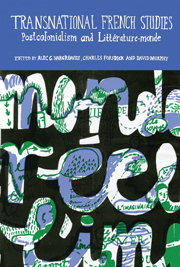Book contents
- Frontmatter
- Contents
- Acknowledgements
- Introduction: What Does Littérature-monde Mean for French, Francophone and Postcolonial Studies?
- From World Literature to Littérature-monde: Genre, History and the Globalization of Literature
- Postcolonialism, Politics and the ‘Becoming-Transnational’ of French Studies
- ‘On the Abolition of the French Department’? Exploring the Disciplinary Contexts of Littérature-monde
- Francophonie: Trash or Recycle?
- (Not) Razing the Walls: Glissant, Trouillot and the Post-Politics of World ‘Literature’
- The ‘Marie NDiaye Affair’ or the Coming of a Postcolonial Evoluée
- (R)Evolutions
- Littérature-monde and Old/New Humanism
- Mapping Littérature-monde
- Afterword: The ‘World’ in World Literature
- Appendix: Toward a ‘World-Literature’ in French
- Notes on Contributors
The ‘Marie NDiaye Affair’ or the Coming of a Postcolonial Evoluée
from Postcolonialism, Politics and the ‘Becoming-Transnational’ of French Studies
- Frontmatter
- Contents
- Acknowledgements
- Introduction: What Does Littérature-monde Mean for French, Francophone and Postcolonial Studies?
- From World Literature to Littérature-monde: Genre, History and the Globalization of Literature
- Postcolonialism, Politics and the ‘Becoming-Transnational’ of French Studies
- ‘On the Abolition of the French Department’? Exploring the Disciplinary Contexts of Littérature-monde
- Francophonie: Trash or Recycle?
- (Not) Razing the Walls: Glissant, Trouillot and the Post-Politics of World ‘Literature’
- The ‘Marie NDiaye Affair’ or the Coming of a Postcolonial Evoluée
- (R)Evolutions
- Littérature-monde and Old/New Humanism
- Mapping Littérature-monde
- Afterword: The ‘World’ in World Literature
- Appendix: Toward a ‘World-Literature’ in French
- Notes on Contributors
Summary
Conrad portrays a void; Hamidou Kane celebrates a human presence and a heroic if doomed struggle. The difference between the two stories is very clear. You might say that difference was the very reason the African writer came into being. His story had been told for him, and he had found the telling quite unsatisfactory.
Chinua Achebe, The Education of a British-Protected Child (2009), 117–18.The awarding of the Prix Goncourt to Marie NDiaye in November 2009 may at first sight appear to have brought further confirmation of the ‘Copernican revolution’ which, according to signatories of the manifesto ‘Pour une “littérature-monde” en français’, has been sweeping through the world of literatures of French expression, casting aside hierarchical distinctions inherited from the colonial era. Yet scarcely had the announcement of NDiaye's triumph been made when it unleashed a furore that showed her to be trapped in a web of identity politics which, in the optic of the manifesto, had supposedly been consigned to the trash can of history. Though the word was not publicly used, NDiaye was, I will argue, treated as a latter-day évoluée.
While deferring unconditional membership to that privileged club that was Frenchness, the French colonial authorities coined the category of évolués in order to designate certain colonized subjects who, through exposure to colonial educational and assimilationist mechanisms, had internalized French cultural and social norms.
- Type
- Chapter
- Information
- Transnational French StudiesPostcolonialism and Littérature-monde, pp. 146 - 163Publisher: Liverpool University PressPrint publication year: 2010
- 2
- Cited by

